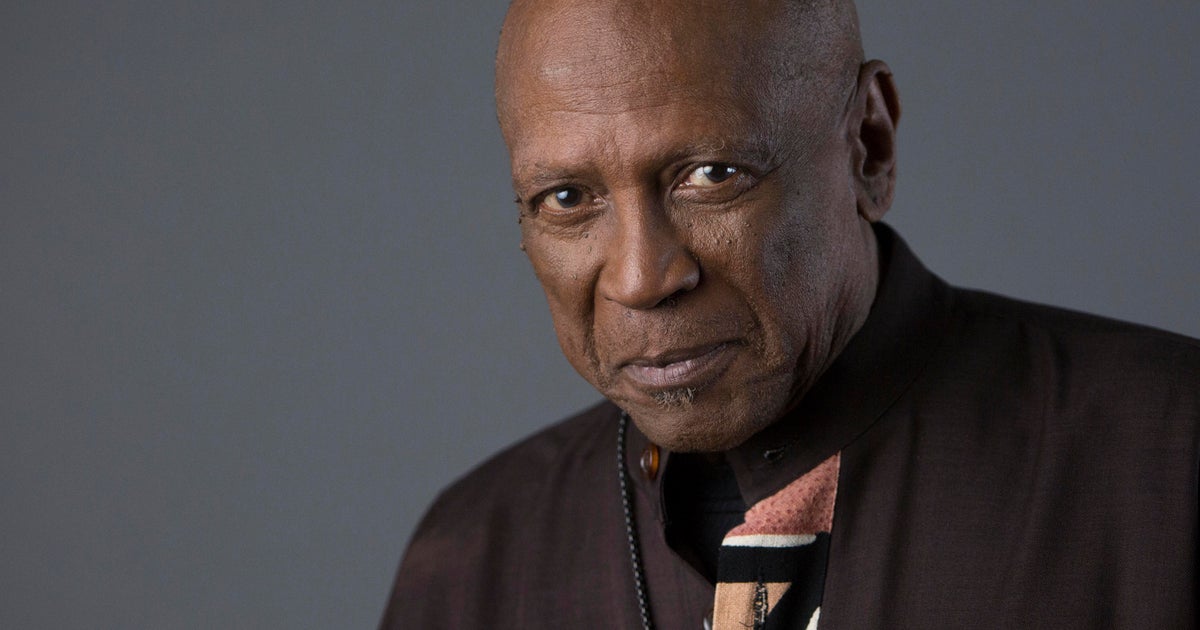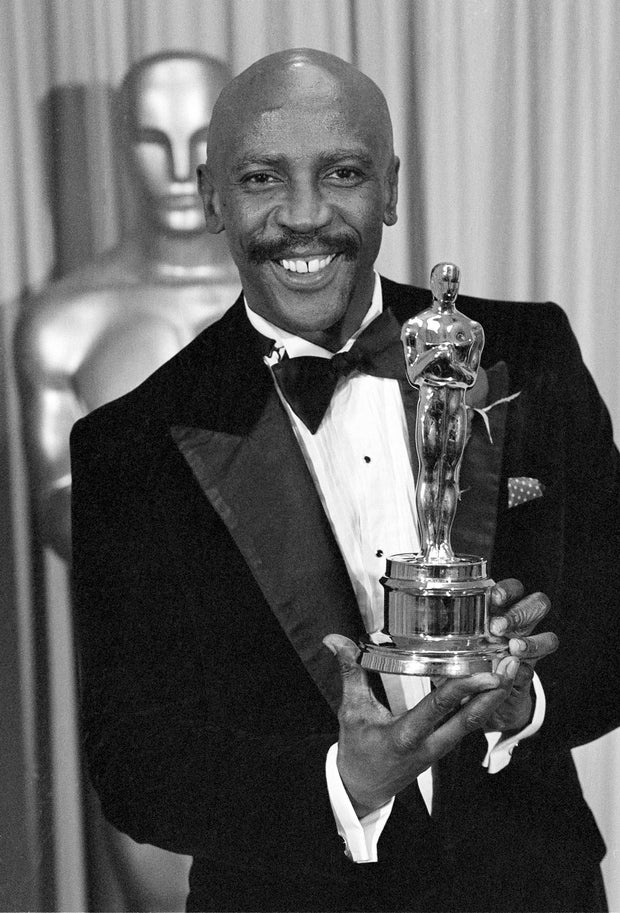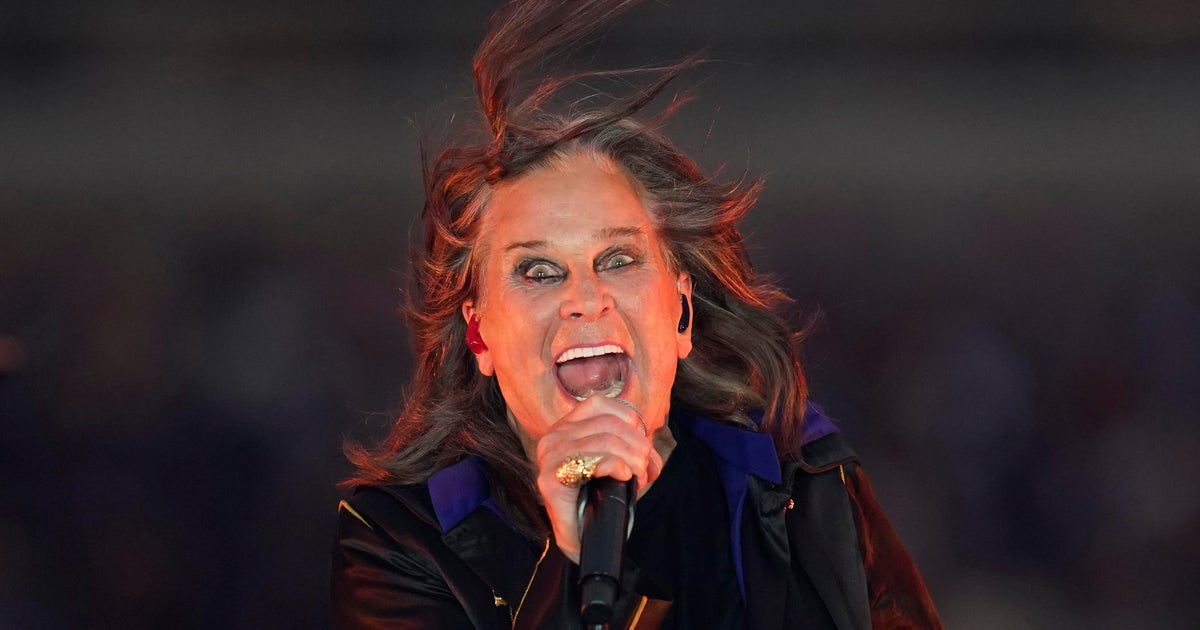CBS News
Louis Gossett Jr., the first Black man to win a supporting actor Oscar, dies at 87

Louis Gossett Jr., the first Black man to win a supporting actor Oscar and an Emmy winner for his role in the seminal TV miniseries “Roots,” has died, The Associated Press reports. He was 87.
Gossett’s nephew told the AP that the actor died Thursday night in Santa Monica, California. No cause of death was revealed.
Gossett always thought of his early career as a reverse Cinderella story, with success finding him from an early age and propelling him forward, toward his Academy Award for “An Officer and a Gentleman.”
He earned his first acting credit in his Brooklyn high school’s production of “You Can’t Take It with You” while he was sidelined from the basketball team with an injury.
“I was hooked — and so was my audience,” he wrote in his 2010 memoir “An Actor and a Gentleman.”
His English teacher urged him to go into Manhattan to try out for “Take a Giant Step.” He got the part and made his Broadway debut in 1953 at age 16.
Amy Sussman/Invision/AP
“I knew too little to be nervous,” Gossett wrote. “In retrospect, I should have been scared to death as I walked onto that stage, but I wasn’t.”
Gossett attended New York University on a basketball and drama scholarship. He was soon acting and singing on TV shows hosted by David Susskind, Ed Sullivan, Red Buttons, Merv Griffin, Jack Paar and Steve Allen. Gossett became friendly with James Dean and studied acting with Marilyn Monroe, Martin Landau and Steve McQueen at an offshoot of the Actors Studio taught by Frank Silvera.
In 1959, Gossett received critical acclaim for his role in the Broadway production of “A Raisin in the Sun” along with Sidney Poitier, Ruby Dee and Diana Sands.
“I’m fortunate to have worked with Sidney Poitier, Diana Sands, Ruby Dee. What a pleasure,” Gossett told CBS News in 2020. “Showed me what was good and what was bad. They taught me about that. And I fell in love. It’s in my bloodstream.”
Gossett went on to become a star on Broadway, replacing Billy Daniels in “Golden Boy” with Sammy Davis Jr. in 1964.
Gossett went to Hollywood for the first time in 1961 to make the film version of “A Raisin in the Sun.” He had bitter memories of that trip, staying in a cockroach-infested motel that was one of the few places to allow Black people.
In 1968, he returned to Hollywood for a major role in “Companions in Nightmare,” NBC’s first made-for-TV movie that starred Melvyn Douglas, Anne Baxter and Patrick O’Neal.
This time, Gossett was booked into the Beverly Hills Hotel and Universal Studios had rented him a convertible. Driving back to the hotel after picking up the car, he was stopped by a Los Angeles County sheriff’s officer who ordered him to turn down the radio and put up the car’s roof before letting him go.
Within minutes, he was stopped by eight sheriff’s officers, who had him lean against the car and made him open the trunk while they called the car rental agency before letting him go.
“Something happened to my system. You know, have to look over and be careful. Because that sensation did damage to me,” Gossett said while recounting the incident in 2020. “So, when they say Black lives matter? All lives matter, because not only did they hurt me, but they hurt themselves.”
After dinner at the hotel, he went for a walk and was stopped a block away by a police officer, who told him he broke a law prohibiting walking around residential Beverly Hills after 9 p.m. Two other officers arrived and Gossett said he was chained to a tree and handcuffed for three hours. He was eventually freed when the original police car returned.
“Now I had come face-to-face with racism, and it was an ugly sight,” he wrote. “But it was not going to destroy me.”
In the late 1990s, Gossett said he was pulled over by police on Pacific Coast Highway while driving his restored 1986 Rolls Royce Corniche II. The officer told him he looked like someone they were searching for, but the officer recognized Gossett and left.
/ AP
He founded the Eracism Foundation to help create a world where racism doesn’t exist.
Gossett made a series of guest appearances on such shows as “Bonanza,” “The Rockford Files,” “The Mod Squad,” “McCloud” and a memorable turn with Richard Pryor on “The Partridge Family.”
In August 1969, Gossett had been partying with members of the Mamas and the Papas when they were invited to actor Sharon Tate’s house. He headed home first to shower and change clothes. As he was getting ready to leave, he caught a news flash on TV about Tate’s murder. She and others were killed by Charles Manson’s associates that night.
“There had to be a reason for my escaping this bullet,” he wrote.
Louis Cameron Gossett was born on May 27, 1936, in the Coney Island section of Brooklyn, New York, to Louis Sr., a porter, and Hellen, a nurse. He later added Jr. to his name to honor his father.
Gossett broke through on the small screen as Fiddler in the groundbreaking 1977 miniseries “Roots,” which depicted the atrocities of slavery on TV. The sprawling cast included Ben Vereen, LeVar Burton and John Amos.
Gossett became the third Black Oscar nominee in the supporting actor category in 1983. He told CBS News that at first, he didn’t realize he had won for his performance as the intimidating Marine drill instructor in “An Officer and a Gentleman” opposite Richard Gere and Debra Winger.
“My agent hit me in the chest and said, ‘They mentioned your name!’ And I had to look at him ’cause I thought I was asleep,” said Gossett, who also won a Golden Globe for the role. “And I looked around and there was applause. Not supposed to be possible. So, that’s a piece of history.”
Gossett said that that win allowed him to choose “good parts” in future movies. In 2020, he told CBS News that he considered his long career “a blessing” and would stay in the business as long as he was able.
“As long as I’m here, there is a job to do for the benefit of us all, for what it’s worth,” he said.
Gossett appeared in such TV movies as “The Story of Satchel Paige,” “Backstairs at the White House, “The Josephine Baker Story,” for which he won another Golden Globe, and “Roots Revisited.” He played an obstinate patriarch in the 2023 remake of “The Color Purple.”
Gossett struggled with alcohol and cocaine addiction for years after his Oscar win. He went to rehab, where he was diagnosed with toxic mold syndrome, which he attributed to his house in Malibu.
In 2010, Gossett announced he had prostate cancer, which he said was caught in the early stages. In 2020, he was hospitalized with COVID-19.
He is survived by sons Satie, a producer-director from his second marriage, and Sharron, a chef whom he adopted after seeing the 7-year-old in a TV segment on children in desperate situations. His first cousin is actor Robert Gossett.
Gossett’s first marriage to Hattie Glascoe was annulled. His second, to Christina Mangosing, ended in divorce in 1975 as did his third to actor Cyndi James-Reese in 1992.
CBS News
Understanding how E.coli spreads after McDonald’s Quarter Pounder outbreak

Watch CBS News
Be the first to know
Get browser notifications for breaking news, live events, and exclusive reporting.
CBS News
Trump and Harris’ policy plans and views on gun control for the 2024 election

Gun control is one of the most polarizing issues in American politics, and it’s been a topic of contention in the 2024 presidential election. Vice President Kamala Harris and former President Donald Trump have been at odds over guns — Trump has told voters Harris “wants to confiscate your guns,” a point Harris denies. She wants to see stronger gun control laws on the books but also says she’s a gun owner. Here are Trump’s and Harris’ stances and policy plans to address gun violence in America.
Kamala Harris’ stance on guns
- Harris says she favors the Second Amendment and said in the Sept. 10 debate with Trump that she owns a gun, a revelation she originally made when she ran for president in In 2019. “I own a gun for probably the reason a lot of people do — for personal safety,” she said at the time. “I was a career prosecutor.” She recently told 60 Minutes she owns a Glock and has fired it at a shooting range.
- Harris oversees the White House Office of Gun Violence and Prevention, which was created by the Biden administration in 2023 with an eye toward finding ways around congressional inaction on stronger gun control laws.
- The Biden administration in 2022 enacted the Bipartisan Safer Communities Act in the wake of the mass shootings in Uvalde, Texas, and Buffalo, New York. It represents the most significant update to gun safety law in almost three decades, augmenting background checks for gun buyers under 21, providing billions for mental health services and closing the so-called “boyfriend loophole” to prevent convicted domestic abusers from purchasing a firearm for five years. It also clarified the definition of gun dealers. The law faces challenges from 26 GOP-led states that are suing to block it.
- Harris’ running mate, Minnesota Gov. Tim Walz, also owns a gun and is an avid hunter. He even held an “A” rating from the NRA at one time, but his grade fell to an “F” in 2018, when he backed stricter gun laws in Minnesota following the Parkland, Florida, school shooting. On the campaign trail in October 2024, Walz went hunting with his own Beretta in an appeal to gun owners.
Kamala Harris’ policy plans on guns
- Harris oversees the White House Office of Gun Violence and Prevention, which was created by the Biden administration in 2023 in order to find a way around congressional inaction on stronger gun control laws.
- Her campaign website says if Harris is elected, she would “ban assault weapons and high-capacity magazines, require universal background checks, and support red flag laws that keep guns out of the hands of dangerous people.”
- Though she says she is a Second Amendment advocate, Harris also favors stronger gun control measures. In a speech on Sept. 12, Harris promised to “pass an assault weapons ban, universal background checks and red flag laws.”
- While running for president in 2019, Harris vowed to take executive action on guns, saying in April 2019 that she would implement “near-universal” background checks, close loopholes to prevent those convicted of domestic violence from obtaining firearms and revoke licenses from gun manufacturers and dealers who break the law. In Oct. 2019 she said she supported a mandatory gun buyback program, but at the Sept. 10 debate, she told Trump, “We’re not taking anybody’s guns away, so stop with the continuous lying about this stuff.”
Donald Trump’s stance on guns
- Trump “believes that every American has a God-given right to protect themselves and their family and has proven through his actions that he will defend law-abiding gun owners,” his campaign said.
- The NRA endorsed Trump in May at its annual convention, and he has addressed the group several times, including in 2022, shortly after the Uvalde mass shooting.
- Shortly after taking office in 2017, Trump signed a bill that rolled back an Obama-era regulation that made it harder for people with mental illnesses to purchase a gun.
- During a White House listening session with students and families affected by the 2018 Parkland mass shooting, Trump suggested bonuses for teachers who are “adept at guns” and offered support for providing concealed carry permits for teachers or retired military personnel on campus.
- After the Las Vegas mass shooting in Oct. 2017, the Bureau of Alcohol, Tobacco and Firearms under the Trump administration banned bump stocks, devices that greatly increase the rate of fire of semi-automatic weapons. The ban was later struck down by the Supreme Court.
Donald Trump’s policy plans for guns
- Trump’s campaign said in a statement that he would “terminate every single one of the Harris-Biden’s attacks on law-abiding gun owners his first week in office and stand up for our constitutionally enshrined right to bear arms.”
- He has not spoken on the campaign trail about specific policy proposals on guns. At the NRA’s Great American Outdoor Show in Harrisburg, Pennsylvania, in February, Trump promised that “no one will lay a finger on your firearms” if he wins the election.
- Trump said in the same speech he “did nothing” to restrict guns while he was in the White House, although his administration enacted the 2017 bump stock ban. After the 2018 mass shooting in Parkland, Florida, he called on Congress to pass bipartisan legislation to strengthen and improve the national instant criminal background check system. And after the 2019 mass shootings in El Paso and Dayton, Ohio, Trump reiterated support for “red flag” laws and stronger background checks, although many Second Amendment activists fought the measure, and it was ultimately abandoned later that year.
CBS News
Home equity loan dos and don’ts to know this November

Getty Images/iStockphoto
If you were looking for a cost-effective way to borrow a large sum of money in recent years, home equity provided the best option. Not only were interest rates lower on home equity loans and home equity lines (HELOCs) than they were on most popular alternatives, but both provided a way to access a six-figure sum that others often couldn’t provide. And now, with one interest rate cut already issued by the Federal Reserve in September and additional ones likely for when it meets again in November and December, both products are poised to be even cheaper for borrowers in the final weeks of 2024.
That noted, home equity borrowing comes with some inherent risks, and borrowers will need to be careful to only withdraw what they’re comfortable repaying or they could risk their homeownership in the process. Understanding this, as well as the dynamics of borrowing home equity in today’s changing rate climate, borrowers should know some important home equity loan dos and don’ts going into November. Below, we’ll break down four of them.
See what home equity loan rate you could secure here now.
Home equity loan dos and don’ts to know this November
Home equity loan borrowing has some timely benefits and disadvantages that can affect your approach. This November, borrowers should specifically consider the following steps:
Do: Choose a HELOC over a home equity loan
Sure, a HELOC has a slightly higher rate than a home equity loan does right now (8.69% versus the latter’s 8.36%). But if you lock in that home equity loan rate now and rates fall as expected, you’ll need to refinance (and pay to refinance) to secure that lower rate. HELOCs, meantime, will simply adjust on their own, lowering your monthly payments as long as interest rates continue to decline.
Explore your best HELOC options online now.
Don’t: Wait for rates to fall
For starters, if you wait for rates to fall, you’ll delay paying the expenses you need the financing for. And if it’s to consolidate high-rate debt, for example, that will come at a cost. But, just as importantly, waiting for rates to fall is a risky move. There’s no guarantee that they will fall or, if they do, by how much. Plus, home equity loan rates don’t move directly in tandem with the federal funds rate anyway. So even if rates were to be cut by 25 basis points, it’s unlikely that home equity loan rates will drop by the same amount.
Do: Shop for lenders
With rates on the decline, it’s more important than usual to shop around for lenders. While most will offer a rate in the approximate same range, every basis point helps. Some lenders, for example, may be more proactive in terms of pricing in presumed rate cuts while others may closely follow the Fed. You won’t know which approach each takes, however, until you shop around.
Don’t: Miss out on certain dates
As noted, some lenders will preemptively price in rate cuts before they’re formally issued. And this often takes place when data that could affect the Fed’s actions is released. So don’t miss out on certain dates in November, like November 7, when unemployment data for October is released. That’s also the date the Fed is set to conclude its next meeting. But keep an eye out for October inflation data, too, which could set the stage for the Fed’s actions in December (scheduled to be released on November 13).
The bottom line
If you’re looking for a way to access large sums of money in a cost-effective way, home equity borrowing can be the smart way to do so this November. Just be sure to take a strategic approach when you do. This means choosing a HELOC over a home equity loan, not waiting for rates to fall and shopping around for lenders to find one offering the best rates and terms. And be sure to monitor certain upcoming dates for opportunities to capitalize on the cooling rate climate.
Have more questions? Learn more about your current home equity loan options here.










